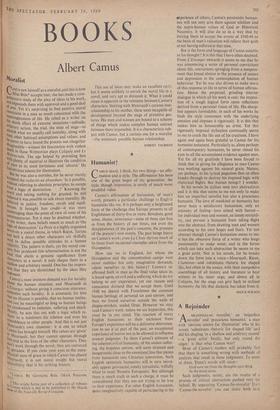Human istt
C mous stood, I think, for two things—an
affir-
mation and a style. The affirmation has been one of the great hopes of my generation; the style, though impressive, is surely of much more doubtful value.
Camus's affirmation of humanism, of man's worth, presents a particular challenge to English humhists like me. It is perhaps only a heightened form of the challenge that Europe presents to all Englishmen of thirty-five or more. Boredom, good sense, shame, annoyance—none of these can free us from the history of our times, not even the disappearance of the past's concerns, the pressure of the present's new events. The past hangs heavy on Camus's work; even La Chute derives much of its force from incidental examples taken from the Occupation.
How can we in England, for whom the Occupation and the concentration camps were never realities but only imaginative demands, adjust ourselves to this history? Camus's re- affirmed faith in man as the final value takes in, is based upon, an evil and a suffering which do not belong to our experience, yet our reason and conscience demand that we accept them. Until 1940 we shared with Frenchmen the common human heritage of personal sin and sorrow; and then we found ourselves outside the walls of plague-stricken, sealed Oran. However we may read Camus's work, unless we are hypocrites, this must be in our mind. The reaction of many English humanists to their exclusion from Europe's experience will be a defensive determina- tion to see it as part of the past, an exceptional experience of horror not to be allowed to influence present judgment. To them Camus's estimate of the inherent evil of humanity, of the useless suffer- ing, the hopeless sorrow, will seem strained and dangerously close to the emotional line that passes from humanism into Christian conversion. Such English optimistic humanists will in turn inevit- ably appear provincial, totally unrealistic, wilfully blind to most Western Europeans. But although there is much truth in such a charge, it must be remembered that they too are trying to be true to their experience. For other English humanists, more imaginatively capable of participating in the experience of others, Camus's pessimistic human- ism will not only arm them against nihilism and the supra-human values of God or Historical Necessity, it will also do so in a way that by forcing them to accept the events of 1940-44 as the basis of man's valuation will relieve their guilt at not having suffered at that time.
But is the form and language of Camus suitable to his thought? It is this that I have often doubted. From L'Etranger onwards it seems to me that he was announcing a series of personal convictions about life, convictions springing from a tempera- ment that found elation in-the presence of nature and depression in the contemplation of human behaviour. Yet he was also driven to make sense of this response to life in terms of human affirma- tion. Hence the perpetual, grinding interior dialogue in which all his work is cast; the imposi- tion of a tough logical form upon reflections derived from a personal vision of life. His discip- line appears formidable; in each of his works he finds the style consonant with the underlying emotion and imposes it rigorously. It is this that makes him so honourable an artist. Yet this rigorously imposed stylisation continually seems to me to crush the life out of his creations. I have again and again been grateful to Camus for his humanist testament. Particularly as, alone perhaps of contemporary humanists, he never closed his eyes to all the accumulated evidence against man. Yet for all my gratitude I have been forced to think that in giving his allegiance to man Camus was working against his natural grain. Nature, yes perhaps, in his lyrical paganism that so often breaks through to destroy his imposed logic with rhetorical flights. But human beings? I wonder.
In his novels he stylises men into abstractions and it is this that seems to me not only to make him an imperfect novelist but also a precarious humanist. The love of mankind or humanity has never been a satisfactory humanism; only an intensity of feeling—love mixed with hatred— for individual men and women, an innate sociabil- ity, can prevent a humanist from taking flight into the abstract, from drawing men and women according to his own hopes and fears. Yet too abstract though Camus's humanism seems to me, it has the obsessive force of a writer who longs passionately to make sense; and in the forms which can take such abstraction he seems to me a great artist. Not in his novels, for he breaks down the form into a voice—Meursault, Rieux, Clamence—and substitutes rhetoric for shaped life; but often in the essays, with their compulsive assemblage of all history and literature to bear witness to his inner urge; and above all in Caligula, for the stage can give back to stylised humanity the life that dialectic has taken from it.
ANGUS WILSON


































 Previous page
Previous page